BU7020 Strategic Issues: E-Business Transforming Hilton & Travelodge
VerifiedAdded on 2023/06/04
|6
|1559
|112
Report
AI Summary
This report provides a comparative analysis of how Hilton Hotels and Travelodge utilize e-business strategies to transform their operations. It highlights Hilton's adoption of online booking platforms and the innovative digital key application, which has significantly increased room bookings. Travelodge, while also employing online booking systems, lacks the advanced digital key feature. The report further discusses affiliate networking programs used by both companies to expand their customer reach and enhance brand visibility. The conclusion emphasizes the importance of e-business integration for maintaining competitiveness in the evolving hospitality industry, where customer expectations for innovative and efficient services are constantly rising. This student contributed the document to Desklib, a platform providing students with access to a variety of study resources, including past papers and solved assignments.
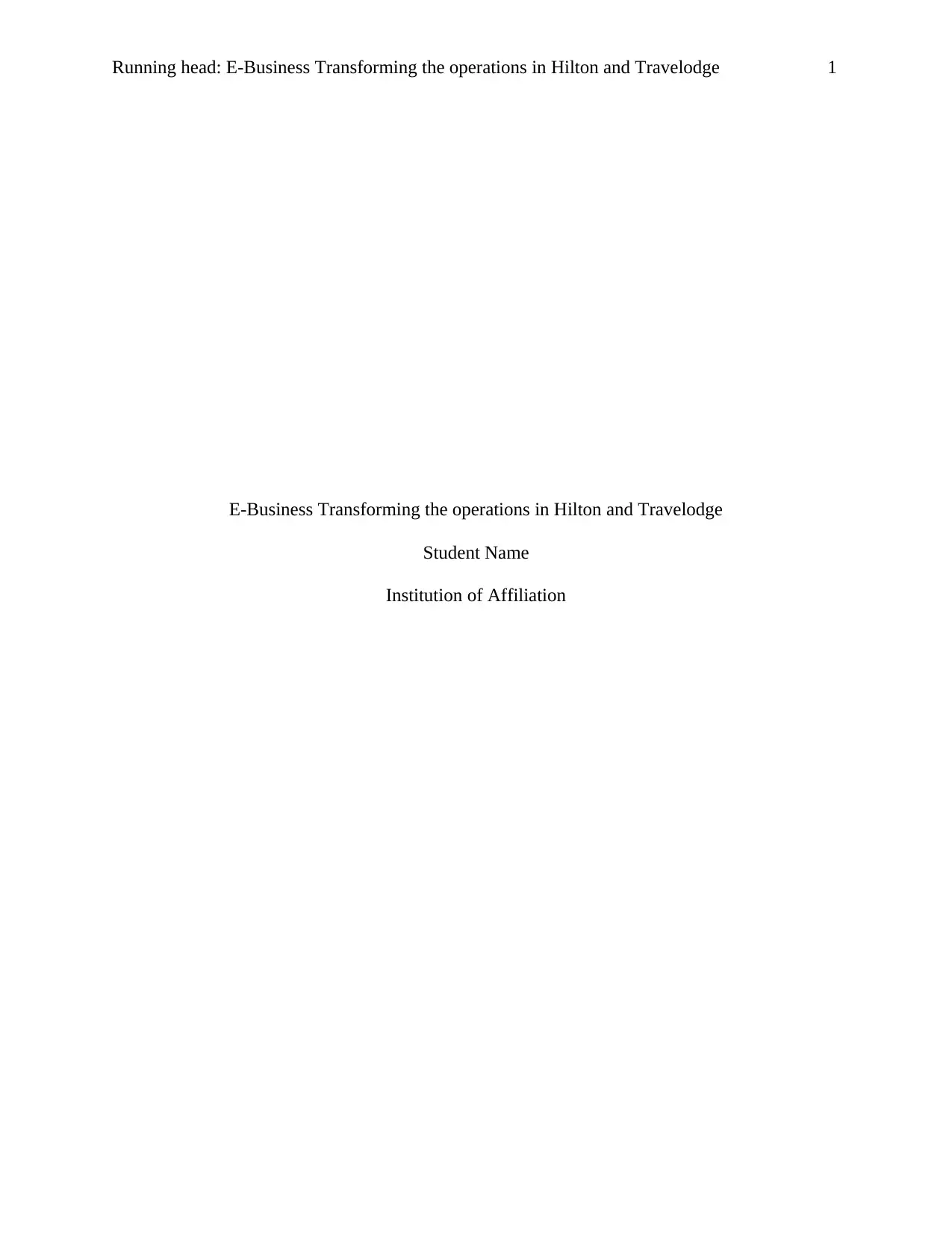
Running head: E-Business Transforming the operations in Hilton and Travelodge 1
E-Business Transforming the operations in Hilton and Travelodge
Student Name
Institution of Affiliation
E-Business Transforming the operations in Hilton and Travelodge
Student Name
Institution of Affiliation
Paraphrase This Document
Need a fresh take? Get an instant paraphrase of this document with our AI Paraphraser
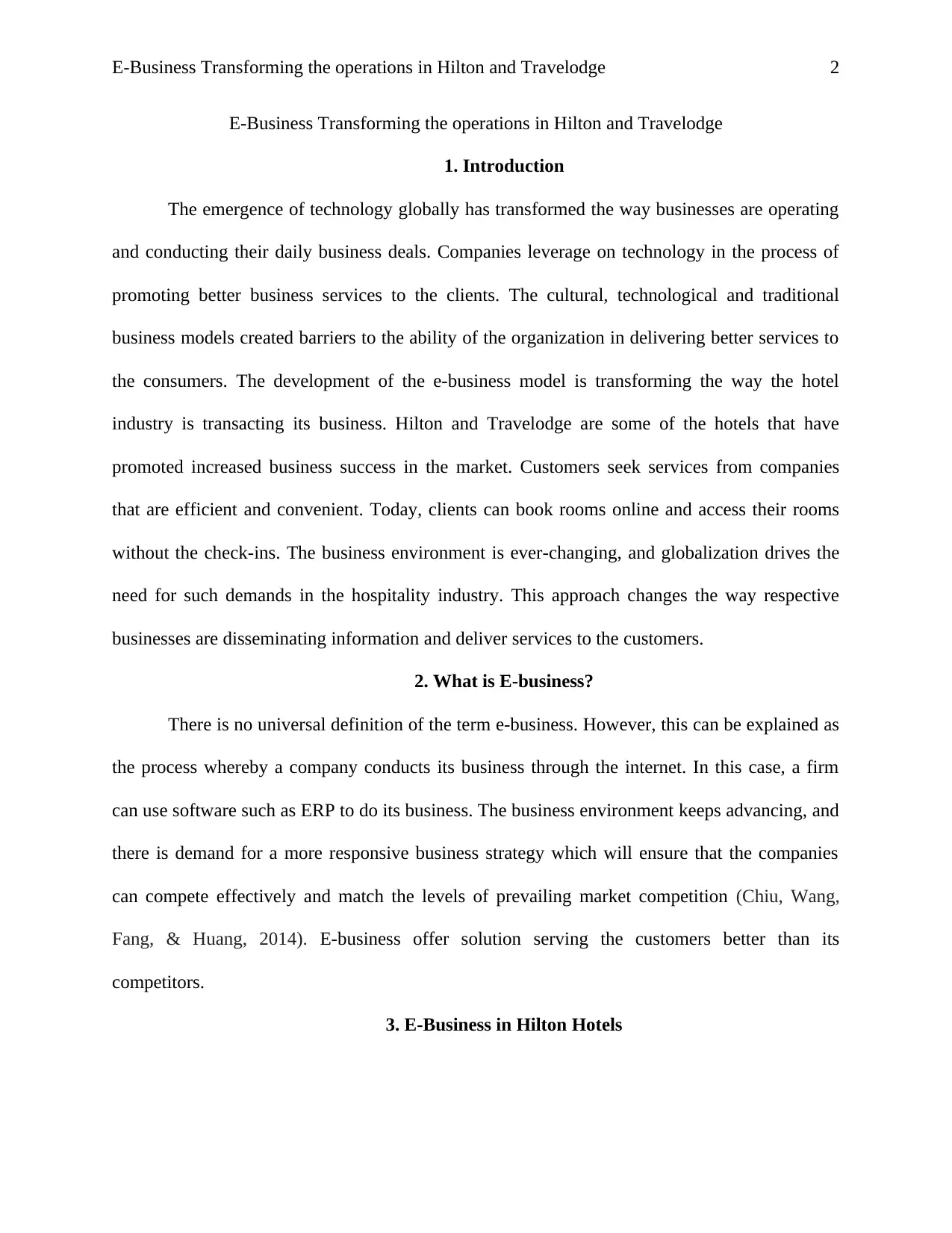
E-Business Transforming the operations in Hilton and Travelodge 2
E-Business Transforming the operations in Hilton and Travelodge
1. Introduction
The emergence of technology globally has transformed the way businesses are operating
and conducting their daily business deals. Companies leverage on technology in the process of
promoting better business services to the clients. The cultural, technological and traditional
business models created barriers to the ability of the organization in delivering better services to
the consumers. The development of the e-business model is transforming the way the hotel
industry is transacting its business. Hilton and Travelodge are some of the hotels that have
promoted increased business success in the market. Customers seek services from companies
that are efficient and convenient. Today, clients can book rooms online and access their rooms
without the check-ins. The business environment is ever-changing, and globalization drives the
need for such demands in the hospitality industry. This approach changes the way respective
businesses are disseminating information and deliver services to the customers.
2. What is E-business?
There is no universal definition of the term e-business. However, this can be explained as
the process whereby a company conducts its business through the internet. In this case, a firm
can use software such as ERP to do its business. The business environment keeps advancing, and
there is demand for a more responsive business strategy which will ensure that the companies
can compete effectively and match the levels of prevailing market competition (Chiu, Wang,
Fang, & Huang, 2014). E-business offer solution serving the customers better than its
competitors.
3. E-Business in Hilton Hotels
E-Business Transforming the operations in Hilton and Travelodge
1. Introduction
The emergence of technology globally has transformed the way businesses are operating
and conducting their daily business deals. Companies leverage on technology in the process of
promoting better business services to the clients. The cultural, technological and traditional
business models created barriers to the ability of the organization in delivering better services to
the consumers. The development of the e-business model is transforming the way the hotel
industry is transacting its business. Hilton and Travelodge are some of the hotels that have
promoted increased business success in the market. Customers seek services from companies
that are efficient and convenient. Today, clients can book rooms online and access their rooms
without the check-ins. The business environment is ever-changing, and globalization drives the
need for such demands in the hospitality industry. This approach changes the way respective
businesses are disseminating information and deliver services to the customers.
2. What is E-business?
There is no universal definition of the term e-business. However, this can be explained as
the process whereby a company conducts its business through the internet. In this case, a firm
can use software such as ERP to do its business. The business environment keeps advancing, and
there is demand for a more responsive business strategy which will ensure that the companies
can compete effectively and match the levels of prevailing market competition (Chiu, Wang,
Fang, & Huang, 2014). E-business offer solution serving the customers better than its
competitors.
3. E-Business in Hilton Hotels
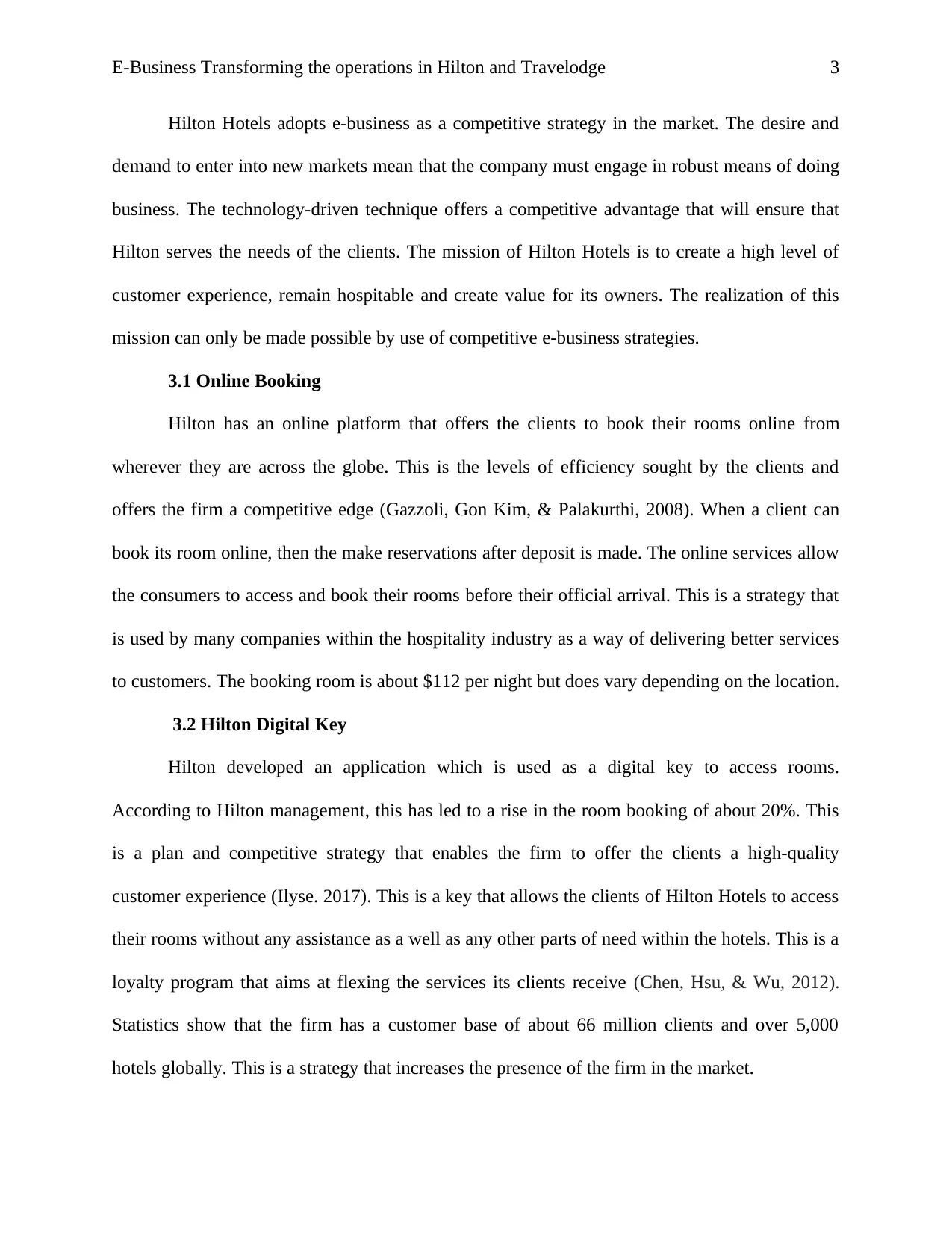
E-Business Transforming the operations in Hilton and Travelodge 3
Hilton Hotels adopts e-business as a competitive strategy in the market. The desire and
demand to enter into new markets mean that the company must engage in robust means of doing
business. The technology-driven technique offers a competitive advantage that will ensure that
Hilton serves the needs of the clients. The mission of Hilton Hotels is to create a high level of
customer experience, remain hospitable and create value for its owners. The realization of this
mission can only be made possible by use of competitive e-business strategies.
3.1 Online Booking
Hilton has an online platform that offers the clients to book their rooms online from
wherever they are across the globe. This is the levels of efficiency sought by the clients and
offers the firm a competitive edge (Gazzoli, Gon Kim, & Palakurthi, 2008). When a client can
book its room online, then the make reservations after deposit is made. The online services allow
the consumers to access and book their rooms before their official arrival. This is a strategy that
is used by many companies within the hospitality industry as a way of delivering better services
to customers. The booking room is about $112 per night but does vary depending on the location.
3.2 Hilton Digital Key
Hilton developed an application which is used as a digital key to access rooms.
According to Hilton management, this has led to a rise in the room booking of about 20%. This
is a plan and competitive strategy that enables the firm to offer the clients a high-quality
customer experience (Ilyse. 2017). This is a key that allows the clients of Hilton Hotels to access
their rooms without any assistance as a well as any other parts of need within the hotels. This is a
loyalty program that aims at flexing the services its clients receive (Chen, Hsu, & Wu, 2012).
Statistics show that the firm has a customer base of about 66 million clients and over 5,000
hotels globally. This is a strategy that increases the presence of the firm in the market.
Hilton Hotels adopts e-business as a competitive strategy in the market. The desire and
demand to enter into new markets mean that the company must engage in robust means of doing
business. The technology-driven technique offers a competitive advantage that will ensure that
Hilton serves the needs of the clients. The mission of Hilton Hotels is to create a high level of
customer experience, remain hospitable and create value for its owners. The realization of this
mission can only be made possible by use of competitive e-business strategies.
3.1 Online Booking
Hilton has an online platform that offers the clients to book their rooms online from
wherever they are across the globe. This is the levels of efficiency sought by the clients and
offers the firm a competitive edge (Gazzoli, Gon Kim, & Palakurthi, 2008). When a client can
book its room online, then the make reservations after deposit is made. The online services allow
the consumers to access and book their rooms before their official arrival. This is a strategy that
is used by many companies within the hospitality industry as a way of delivering better services
to customers. The booking room is about $112 per night but does vary depending on the location.
3.2 Hilton Digital Key
Hilton developed an application which is used as a digital key to access rooms.
According to Hilton management, this has led to a rise in the room booking of about 20%. This
is a plan and competitive strategy that enables the firm to offer the clients a high-quality
customer experience (Ilyse. 2017). This is a key that allows the clients of Hilton Hotels to access
their rooms without any assistance as a well as any other parts of need within the hotels. This is a
loyalty program that aims at flexing the services its clients receive (Chen, Hsu, & Wu, 2012).
Statistics show that the firm has a customer base of about 66 million clients and over 5,000
hotels globally. This is a strategy that increases the presence of the firm in the market.
⊘ This is a preview!⊘
Do you want full access?
Subscribe today to unlock all pages.

Trusted by 1+ million students worldwide
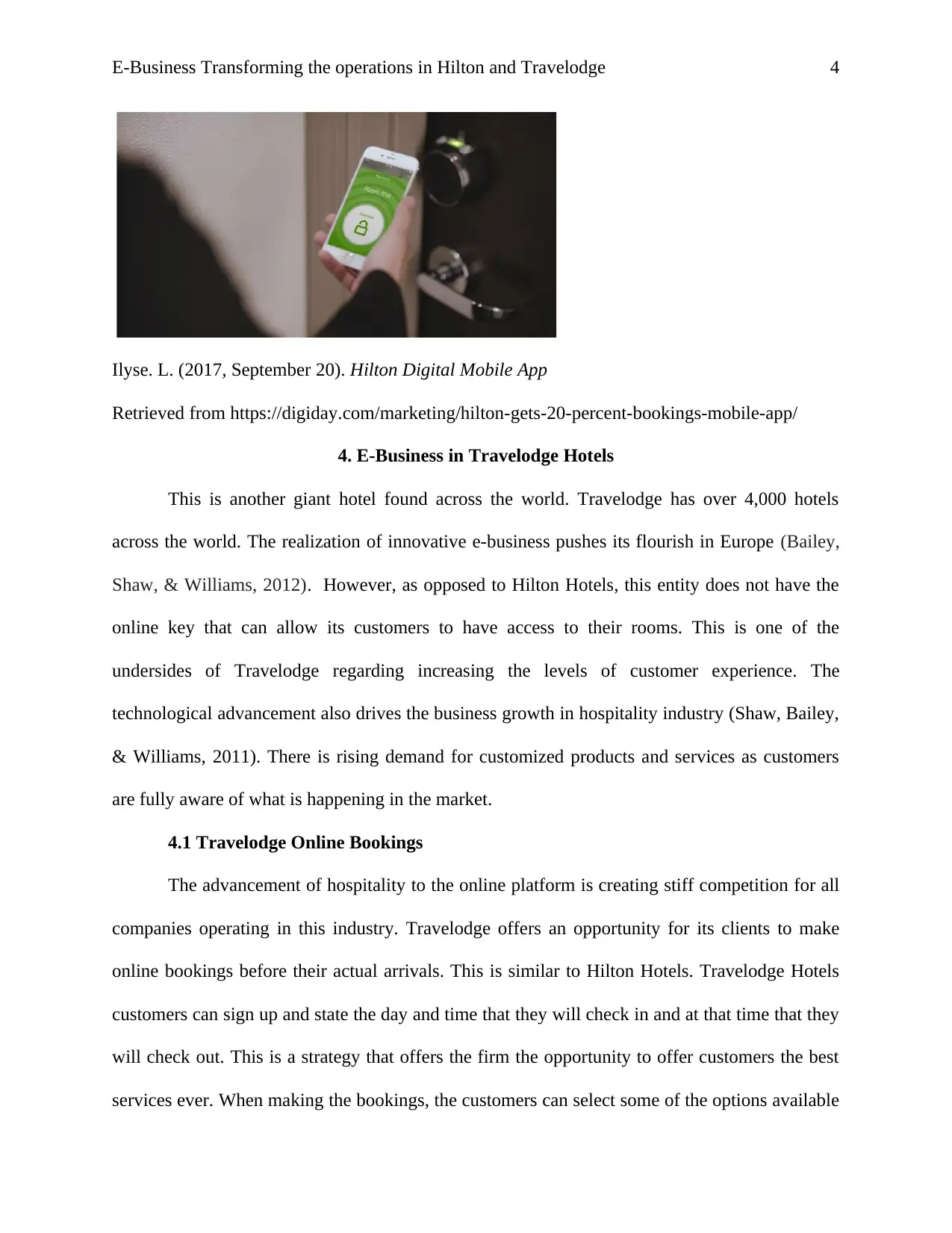
E-Business Transforming the operations in Hilton and Travelodge 4
Ilyse. L. (2017, September 20). Hilton Digital Mobile App
Retrieved from https://digiday.com/marketing/hilton-gets-20-percent-bookings-mobile-app/
4. E-Business in Travelodge Hotels
This is another giant hotel found across the world. Travelodge has over 4,000 hotels
across the world. The realization of innovative e-business pushes its flourish in Europe (Bailey,
Shaw, & Williams, 2012). However, as opposed to Hilton Hotels, this entity does not have the
online key that can allow its customers to have access to their rooms. This is one of the
undersides of Travelodge regarding increasing the levels of customer experience. The
technological advancement also drives the business growth in hospitality industry (Shaw, Bailey,
& Williams, 2011). There is rising demand for customized products and services as customers
are fully aware of what is happening in the market.
4.1 Travelodge Online Bookings
The advancement of hospitality to the online platform is creating stiff competition for all
companies operating in this industry. Travelodge offers an opportunity for its clients to make
online bookings before their actual arrivals. This is similar to Hilton Hotels. Travelodge Hotels
customers can sign up and state the day and time that they will check in and at that time that they
will check out. This is a strategy that offers the firm the opportunity to offer customers the best
services ever. When making the bookings, the customers can select some of the options available
Ilyse. L. (2017, September 20). Hilton Digital Mobile App
Retrieved from https://digiday.com/marketing/hilton-gets-20-percent-bookings-mobile-app/
4. E-Business in Travelodge Hotels
This is another giant hotel found across the world. Travelodge has over 4,000 hotels
across the world. The realization of innovative e-business pushes its flourish in Europe (Bailey,
Shaw, & Williams, 2012). However, as opposed to Hilton Hotels, this entity does not have the
online key that can allow its customers to have access to their rooms. This is one of the
undersides of Travelodge regarding increasing the levels of customer experience. The
technological advancement also drives the business growth in hospitality industry (Shaw, Bailey,
& Williams, 2011). There is rising demand for customized products and services as customers
are fully aware of what is happening in the market.
4.1 Travelodge Online Bookings
The advancement of hospitality to the online platform is creating stiff competition for all
companies operating in this industry. Travelodge offers an opportunity for its clients to make
online bookings before their actual arrivals. This is similar to Hilton Hotels. Travelodge Hotels
customers can sign up and state the day and time that they will check in and at that time that they
will check out. This is a strategy that offers the firm the opportunity to offer customers the best
services ever. When making the bookings, the customers can select some of the options available
Paraphrase This Document
Need a fresh take? Get an instant paraphrase of this document with our AI Paraphraser
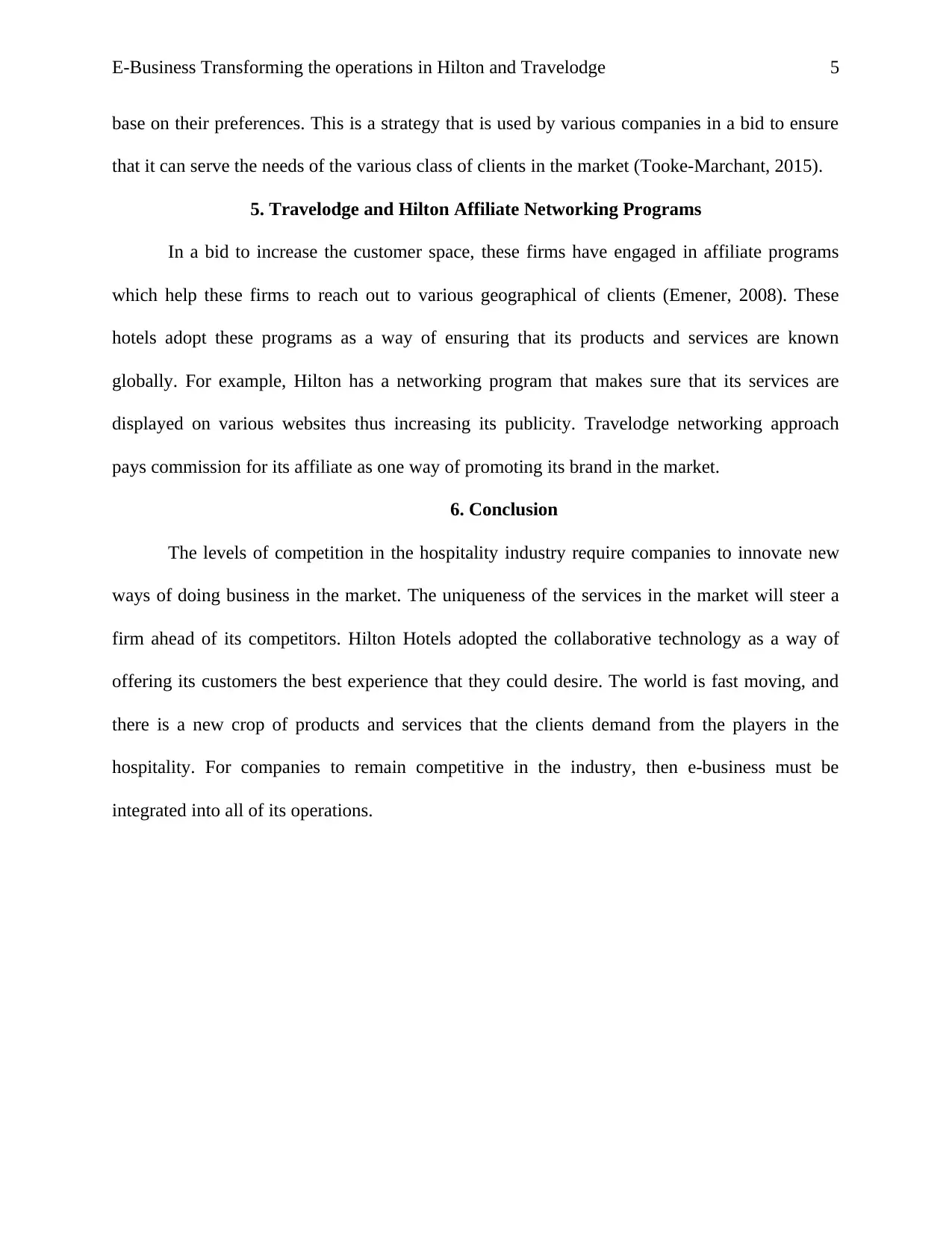
E-Business Transforming the operations in Hilton and Travelodge 5
base on their preferences. This is a strategy that is used by various companies in a bid to ensure
that it can serve the needs of the various class of clients in the market (Tooke-Marchant, 2015).
5. Travelodge and Hilton Affiliate Networking Programs
In a bid to increase the customer space, these firms have engaged in affiliate programs
which help these firms to reach out to various geographical of clients (Emener, 2008). These
hotels adopt these programs as a way of ensuring that its products and services are known
globally. For example, Hilton has a networking program that makes sure that its services are
displayed on various websites thus increasing its publicity. Travelodge networking approach
pays commission for its affiliate as one way of promoting its brand in the market.
6. Conclusion
The levels of competition in the hospitality industry require companies to innovate new
ways of doing business in the market. The uniqueness of the services in the market will steer a
firm ahead of its competitors. Hilton Hotels adopted the collaborative technology as a way of
offering its customers the best experience that they could desire. The world is fast moving, and
there is a new crop of products and services that the clients demand from the players in the
hospitality. For companies to remain competitive in the industry, then e-business must be
integrated into all of its operations.
base on their preferences. This is a strategy that is used by various companies in a bid to ensure
that it can serve the needs of the various class of clients in the market (Tooke-Marchant, 2015).
5. Travelodge and Hilton Affiliate Networking Programs
In a bid to increase the customer space, these firms have engaged in affiliate programs
which help these firms to reach out to various geographical of clients (Emener, 2008). These
hotels adopt these programs as a way of ensuring that its products and services are known
globally. For example, Hilton has a networking program that makes sure that its services are
displayed on various websites thus increasing its publicity. Travelodge networking approach
pays commission for its affiliate as one way of promoting its brand in the market.
6. Conclusion
The levels of competition in the hospitality industry require companies to innovate new
ways of doing business in the market. The uniqueness of the services in the market will steer a
firm ahead of its competitors. Hilton Hotels adopted the collaborative technology as a way of
offering its customers the best experience that they could desire. The world is fast moving, and
there is a new crop of products and services that the clients demand from the players in the
hospitality. For companies to remain competitive in the industry, then e-business must be
integrated into all of its operations.
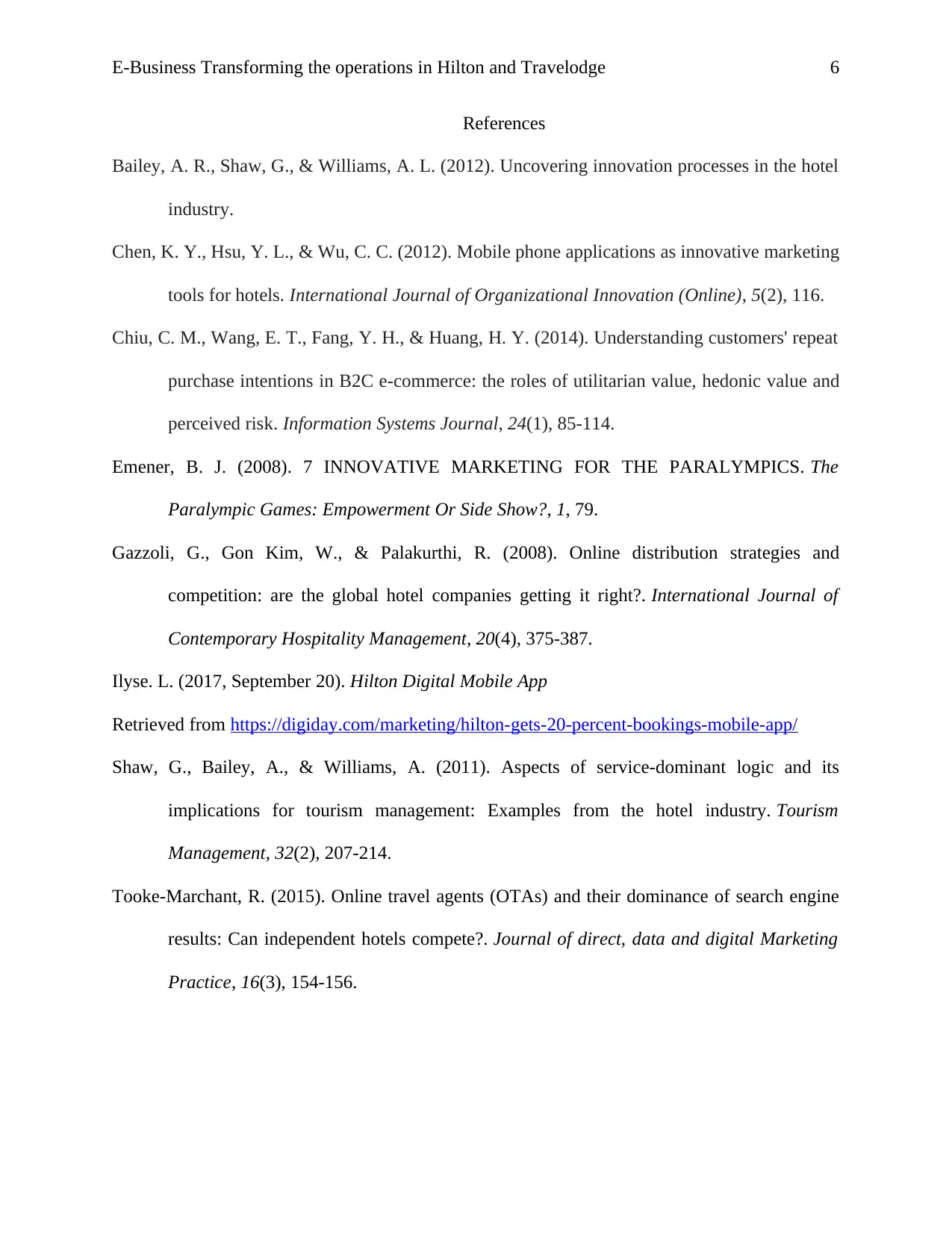
E-Business Transforming the operations in Hilton and Travelodge 6
References
Bailey, A. R., Shaw, G., & Williams, A. L. (2012). Uncovering innovation processes in the hotel
industry.
Chen, K. Y., Hsu, Y. L., & Wu, C. C. (2012). Mobile phone applications as innovative marketing
tools for hotels. International Journal of Organizational Innovation (Online), 5(2), 116.
Chiu, C. M., Wang, E. T., Fang, Y. H., & Huang, H. Y. (2014). Understanding customers' repeat
purchase intentions in B2C e‐commerce: the roles of utilitarian value, hedonic value and
perceived risk. Information Systems Journal, 24(1), 85-114.
Emener, B. J. (2008). 7 INNOVATIVE MARKETING FOR THE PARALYMPICS. The
Paralympic Games: Empowerment Or Side Show?, 1, 79.
Gazzoli, G., Gon Kim, W., & Palakurthi, R. (2008). Online distribution strategies and
competition: are the global hotel companies getting it right?. International Journal of
Contemporary Hospitality Management, 20(4), 375-387.
Ilyse. L. (2017, September 20). Hilton Digital Mobile App
Retrieved from https://digiday.com/marketing/hilton-gets-20-percent-bookings-mobile-app/
Shaw, G., Bailey, A., & Williams, A. (2011). Aspects of service-dominant logic and its
implications for tourism management: Examples from the hotel industry. Tourism
Management, 32(2), 207-214.
Tooke-Marchant, R. (2015). Online travel agents (OTAs) and their dominance of search engine
results: Can independent hotels compete?. Journal of direct, data and digital Marketing
Practice, 16(3), 154-156.
References
Bailey, A. R., Shaw, G., & Williams, A. L. (2012). Uncovering innovation processes in the hotel
industry.
Chen, K. Y., Hsu, Y. L., & Wu, C. C. (2012). Mobile phone applications as innovative marketing
tools for hotels. International Journal of Organizational Innovation (Online), 5(2), 116.
Chiu, C. M., Wang, E. T., Fang, Y. H., & Huang, H. Y. (2014). Understanding customers' repeat
purchase intentions in B2C e‐commerce: the roles of utilitarian value, hedonic value and
perceived risk. Information Systems Journal, 24(1), 85-114.
Emener, B. J. (2008). 7 INNOVATIVE MARKETING FOR THE PARALYMPICS. The
Paralympic Games: Empowerment Or Side Show?, 1, 79.
Gazzoli, G., Gon Kim, W., & Palakurthi, R. (2008). Online distribution strategies and
competition: are the global hotel companies getting it right?. International Journal of
Contemporary Hospitality Management, 20(4), 375-387.
Ilyse. L. (2017, September 20). Hilton Digital Mobile App
Retrieved from https://digiday.com/marketing/hilton-gets-20-percent-bookings-mobile-app/
Shaw, G., Bailey, A., & Williams, A. (2011). Aspects of service-dominant logic and its
implications for tourism management: Examples from the hotel industry. Tourism
Management, 32(2), 207-214.
Tooke-Marchant, R. (2015). Online travel agents (OTAs) and their dominance of search engine
results: Can independent hotels compete?. Journal of direct, data and digital Marketing
Practice, 16(3), 154-156.
⊘ This is a preview!⊘
Do you want full access?
Subscribe today to unlock all pages.

Trusted by 1+ million students worldwide
1 out of 6
Related Documents
Your All-in-One AI-Powered Toolkit for Academic Success.
+13062052269
info@desklib.com
Available 24*7 on WhatsApp / Email
![[object Object]](/_next/static/media/star-bottom.7253800d.svg)
Unlock your academic potential
Copyright © 2020–2026 A2Z Services. All Rights Reserved. Developed and managed by ZUCOL.





